A big thank you to every reader. This newsletter has made writing more viable, allowing me to scratch itches I’ve wanted to scratch for years. The generosity of those of you who pay to read it really means a great deal.
Today I’m taking you to Devon to meet Geetie Singh-Watson at Totnes Market. We’ll be back in Devon with Geetie next Monday, talking about her award winning The organic Bull Inn and The Baddaford Farm Collective.
Geetie opened The Duke of Cambridge in North London, the first certified organic pub in the world in 1998. We met for the first time around 2000 when I began at London Farmers Markets. We were both founding members of The London Food Board and involved in sustainable food debates in London, sharing similar dreams, and energy for the food sector.
She moved to Devon in 2012 when she fell in love with Guy Watson, the founder of Riverford Organics, whilst they were walking in a radicchio field. Geetie opened The organic Bull Inn in Totnes in December 2019, a 100% organic, sustainable pub with rooms, run on a philosophy of Doing Business Better.
On the way to my room at The Bull, I was shown a cupboard in the hall, stacked with herbal teas, soaps, towels, ‘ if you need anything just help yourself'. It's so Geetie that every element has been thoughtfully considered, from where they source linens, to paint, soaps and furniture. There are notes, asking guests not to over fill the kettle, and to turn off the radiator if opening a window.
In the restaurant the menu is vegetable forward, fish from small boats, and any meat is whole carcass used. No waste, no cling film. Sensible portions. It's a few years since we've met; last year our meeting was cancelled when Geetie had flu. Finding a date to meet for dinner with her, and our mutual friend Caroline is nothing short of a miracle.
Totnes is often described as quirky. New age. Different. It has a leech well, a castle, very few chain stores and plenty of independent businesses on the high street.
In 2007 it was the first town in the UK to introduce its very own currency to strengthen the local economy. Totnes is home to the Transition Town movement and it’s not hard to find plenty of grass roots based community groups to get involved with.
Meeting Geetie at The Bull on market day, she announces that she’s slightly nervous. For most interviews, she says, she can put on a face but we’re friends so it’s different. I’m relieved; I’m also nervous for the same reason, and I’ve been going over questions to ask her. Two nervous people, I decide, cancel out each other.
The market is divided into two parts; antiques on one side, food and crafts on the other. We’ve walked down a side street, straight into the antiques section, and immediately Geetie’s spotted a pair of velvet curtains. She knows everyone at the market, there’s plenty of nods of recognition.
Can you barter anymore?
Ofcourse not! It wouldn’t be right. Everyone knows us. They’d just laugh.
Do you have a set routine when you shop here?
I do. I go straight to certain stalls that I specifically want to check what they've got, so I know who's going have the best, the most exciting antiques. Sometimes I'm really manic about it.
Geetie points out one of the sellers; ‘‘Richard has brilliant plates; he’s supplied us with masses for the pub.’’
What is it that you love about Totnes Market?
‘‘There's something incredibly human about it. The guys who've been trading here for years.’’ She asks Richard, how long has he been here;
‘‘Twenty five years. There you go.’’ Another stall holder chips in; ‘‘I've been here over forty.’’ Geetie looks impressed. ‘‘Over forty. Wow.’’
‘‘You do tend to stay. There's a real permanence to it. And it's the mix as well, isn't it?’’
‘‘Secondhand stuff from all over the world. And really great finds. There has been endless rumours about it being shut down, but I don't think it will happen, do you? Let's hope not.’’

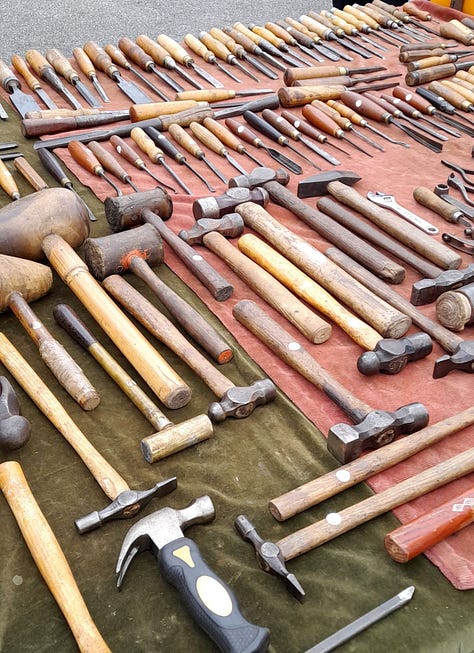



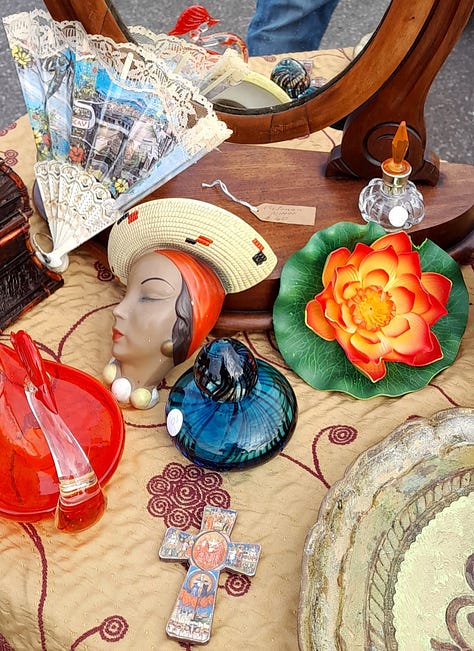
She’s distracted by a Staffordshire dog on a stall.
‘‘That is a really lovely Staffy. How much?’’
We’ve only been in the market a few minutes and already Geetie has bought the velvet curtains, a yellow eyed Staffordshire dog figurine, a collection of glasses, and a pile of plates. A cream coloured tablecloth is next; I’m in admiration of her keen eye.
What draws you to the market?
‘‘All the lovely, amazing vintage bits. So much of my house was furnished by this place, let alone the pub.’’
Geetie points to a display of beautifully simple shaker style handcrafted stools and tables. ‘‘He made the bench in your room at The Bull.’’
‘‘We had a fallen oak tree that Guy loved on the farm, and he got it sawn up.
And then someone turned them into benches for us. We traded wood so the benches were free and he got a load of wood and it was just that kind of human interaction trade. It happens here all the time, I really love it ’’
‘‘There’s a real genuine love and re-purposing here. I suppose it's the same at all antique fairs, but this is every Friday, every Saturday, and it's always packed. Really effective.’’
She’s aware that sometimes she overbuys…
‘‘Why did I buy it? I did not need another bench. Just so it's sitting inside the front of the house at the moment.’’ Now her attention has moved on to another bargain. ‘‘How much is that? Just a couple of pounds. So sweet.’’
‘‘Two markets side by side, antiques and food. They complement each other. I'll be buying antiques, but might buy the odd food item.
I don't buy an awful lot of food just because I'm in the industry. So I've got my own food shit going on everywhere with Guy and me.’’
Exactly what I was going to ask; does Geetie actually need to buy any food, considering she lives on a farm and runs a restaurant.
She looks mischievous.
‘‘If I'm really cross with Guy, I buy vegetables as a punishment because he really minds. And if I'm like, proper cross, I go and buy Riverford vegetables in a shop. And then he's like, why would you do that? But, otherwise, no.’’


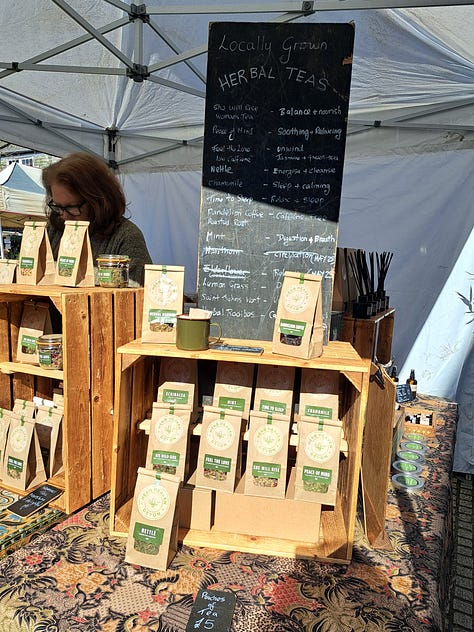
We’ve crossed the market into the food and craft section. There are several vegetable stalls, the first one, obviously a wholesaler. Two bakers, a honey stall, mushrooms, eggs, herb teas, an organic plant nursery, several stalls selling hot food. Olive oil, chillies, a few farm stalls selling meat and poultry.
Geetie is still thinking about my question about buying food. ‘‘We don't necessarily have access to the best of the Riverford veg because the priority is the veg box, and Guy is not allowed to take produce that is allocated, which is fair enough. So sometimes I will buy peak stuff that I can't get off them, and bread, obviously, there's some brilliant bakers around here.’’
We’ve arrived at the fish stall. ‘‘The fish guy is quite interesting, but there's no traceability’’ I ask; so you wouldn't buy the fish because of the traceability?
‘‘I might if he had something that I thought was fairly benign like mussels or something like that. But I wouldn't otherwise.
Do you ever ask questions about ingredients?
‘‘Yes. Absolutely. I do.’’
We’ve reached The Apricot Centre stall, a local organic biodynamic farm. Baskets of organic vegetables, boxes of eggs, jars of organic lard and beef dripping, preserves, local flour and leaflets about ordering meat.
Geetie visibly brightens. ‘‘The Apricot Centre, are just brilliant.’’
‘‘They used to be in Essex and I would buy from Marina for The Duke.’’
‘‘Marina who founded The Apricot Centre moved down here about a year after I did. We never really knew each other before then. Down here, we became much closer. She died this year, just heartbreaking. We buy a lot of their meat and their veg. Because they do a veg box scheme, we buy their overflow rather than being a direct trade with them. And that is something that I began very much at The Duke, trying to support farmers on farmers markets and buying their overflow. That's how I began to trade with them.
I would go to the markets at the end of the day and say, what have you got left? I'll take it. And that's that's how they began to believe and have faith in the fact that I was going to trade with them as a restaurant. And eventually, they started to supply and bring produce in.
It took about a year of commitment before they said, alright I'll supply you. Because the margin's so much lower when they're selling to us. If they can get the trade out of the market, they'll just focus on that.
The Apricot Centre, do training courses too. They're fantastic.
We're working very closely with them at the moment on training for ourselves. And we have got apprentices from them for our farm. One of our very first apprentices is now the farm manager. We've gone through this wonderful process with them. It's a very, exciting area from that point of view. It was exciting in London too, working with you (London Farmers Markets) and Growing Communities.
In the light of how we are being corrupted by the negative policies we're hearing all around the world, this is where hope lies. This is what we should be latching onto because this is humanity; continuing to trade kindly, supporting the planet and each other. There isn't anywhere you go where you wouldn't find these incredible communities doing grassroots good work for the community. And we just have to latch onto that and not listen to Trump and Steve Bannon.
To anyone who thinks buying direct from farmers or shopping at farmers markets isn’t for them, what response would you give?
Oh, that's kind of heartbreaking because, when you're buying directly at a farmer's market, I think the tangibility of the produce is part of it. To be able to make the decision that you're happy with this blotchy apple because you get the real connection to the farmer.
If you're in a supermarket, there's a chain of selection that's put it in front of you and you can reject it, saying I want the very best.
But here, you'll be really willing to engage with veg. And when Guy and I first got together, I would go to the farmer's market in London and take home the veg I’d bought, and he would just be fascinated by it. He'd say, if I try to sell this in my veg box, people would go mad.
They'd be really cross, but it’s the fact that it's the disconnect.. You can choose that slightly skanky cabbage yourself, because you can see that just a couple of leaves are torn or eaten by insects, the rest is fine. And you feel it gives you the direct connection to the earth where it was grown. You could do your whole weekly shop here.
This is soul enhancing human connection. It's a pleasurable activity rather than going to supermarkets, which is something you've got to get over and done with. The most vital aspect of it is, you might spend a little bit more on individual ingredients. You probably will. There's not all the other rubbish being sold to you. So you don't end up with all those extra biscuits and whatever's bring promoted; you end up piling your basket with stuff you didn't need. Here, you're just buying what you want.
The beautiful thing about produce on farmers markets; your money's going directly to farmers. It's one of our philosophies at The Bull that as much as we possibly can, money is going direct to the growers because they desperately need it. We don't really challenge price. We ask people what do you need to charge us. If they can come down, they'll come down. But if they can't, that's completely fine. We just make it work on our menu.
We’ve stopped to say hello to Kerry, one of the stall holders who’s weaving willow she cultivates, into baskets and lamps.
‘‘We buy directly from farmers as much as we possibly can. We did an analysis on it last year, and we spent £400,000 that went directly to farmers within a 15 mile radius of The Bull. It's really amazing and a tangible and beautiful contribution to the local economy. It's so logical.’’
Are there particular ingredients that inspire you to cook? And do you cook?
‘‘Oh, I do cook. Guy is the main cook in our household. I have married the most perfect man. I come home, or he'll call me in the morning and he’ll ask, what do you want for supper? And I'll say, I want this, and I want you to cook it exactly like this.
‘‘And he does. And it's really great. So he does the cooking, but it's salad that inspires me. It's salad that makes me start buying way more than I possibly should. Not only that, it's also every new season ingredient.
‘‘I have ruthlessly bought seasonally for decades. That's one of the things that farmers markets really allow you to do. You get the very best of the produce. Since being with Guy, it's not quite so easy because Riverford box scheme isn't unconditionally seasonal, so I buy more.
‘‘But I miss that oh my god, ‘asparagus or aubergines are back’ moment.
‘‘What's really fascinating in restaurants when you're buying seasonally is how the chefs have to remind themselves when for example, aubergines come back in; you almost see the memory build as the menu carries the aubergines because they get so excited to play with them. Why are we seeing aubergines in February?’’
Who would you say is the biggest food influence in your life apart from Guy?
‘‘I would say the farmers, the growers, the producers. Absolutely.
It's not an individual chef in any way at all. It's the ingredients. There you go. Look at that. Perfect queen in the markets girl.’’
We visited Totnes weekly market which takes place every Friday and Saturday.
The Apricot Centre are at the market on Fridays;
The Organic Bull Inn, Totnes. Restaurant and rooms.
See you next week for the second part.
If you've liked reading about Geetie and would like to support my writing…
A cup of coffee would be lovely, thank you 😊 or…if you can afford to, please consider becoming a paid subscriber.






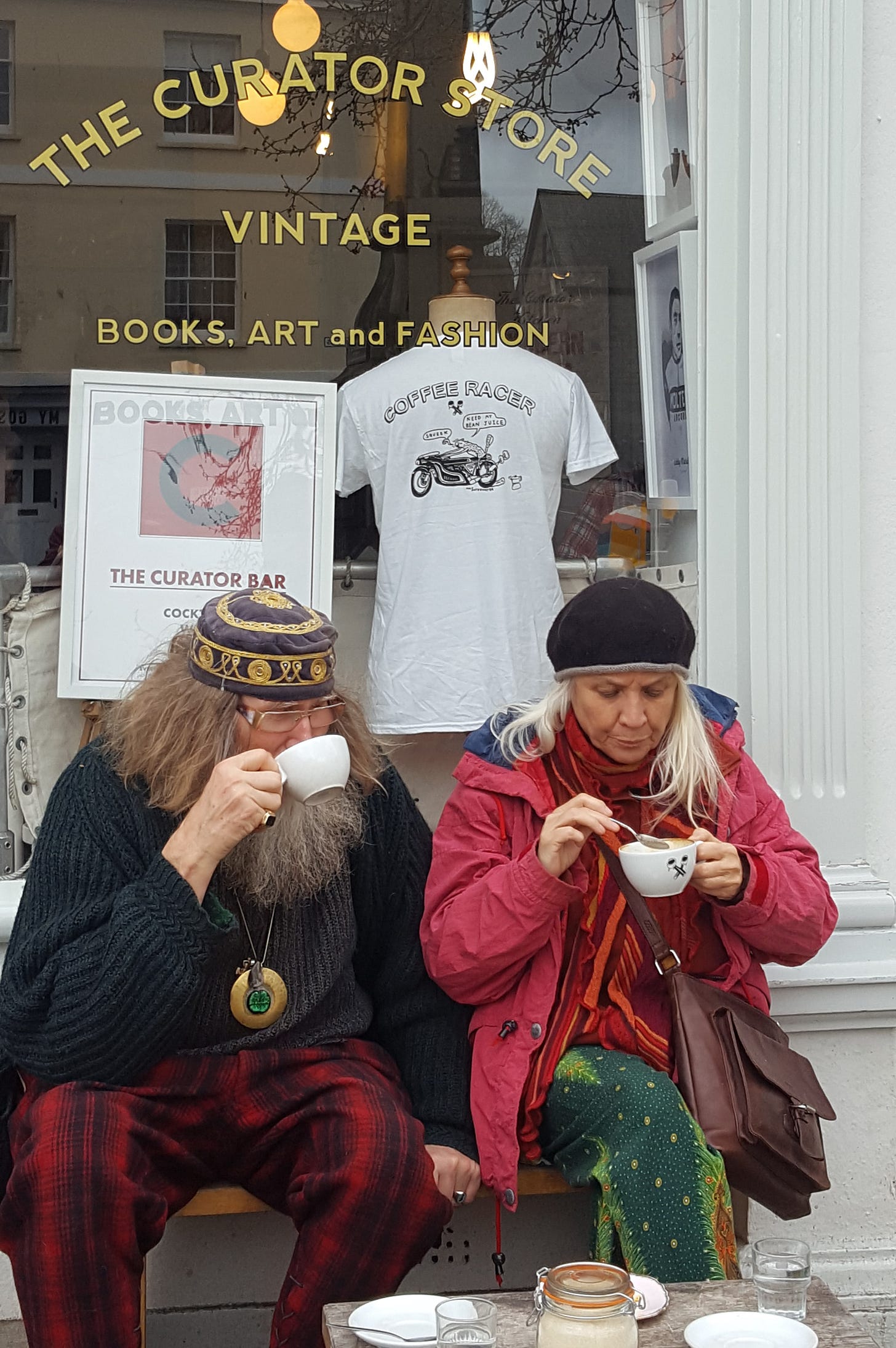
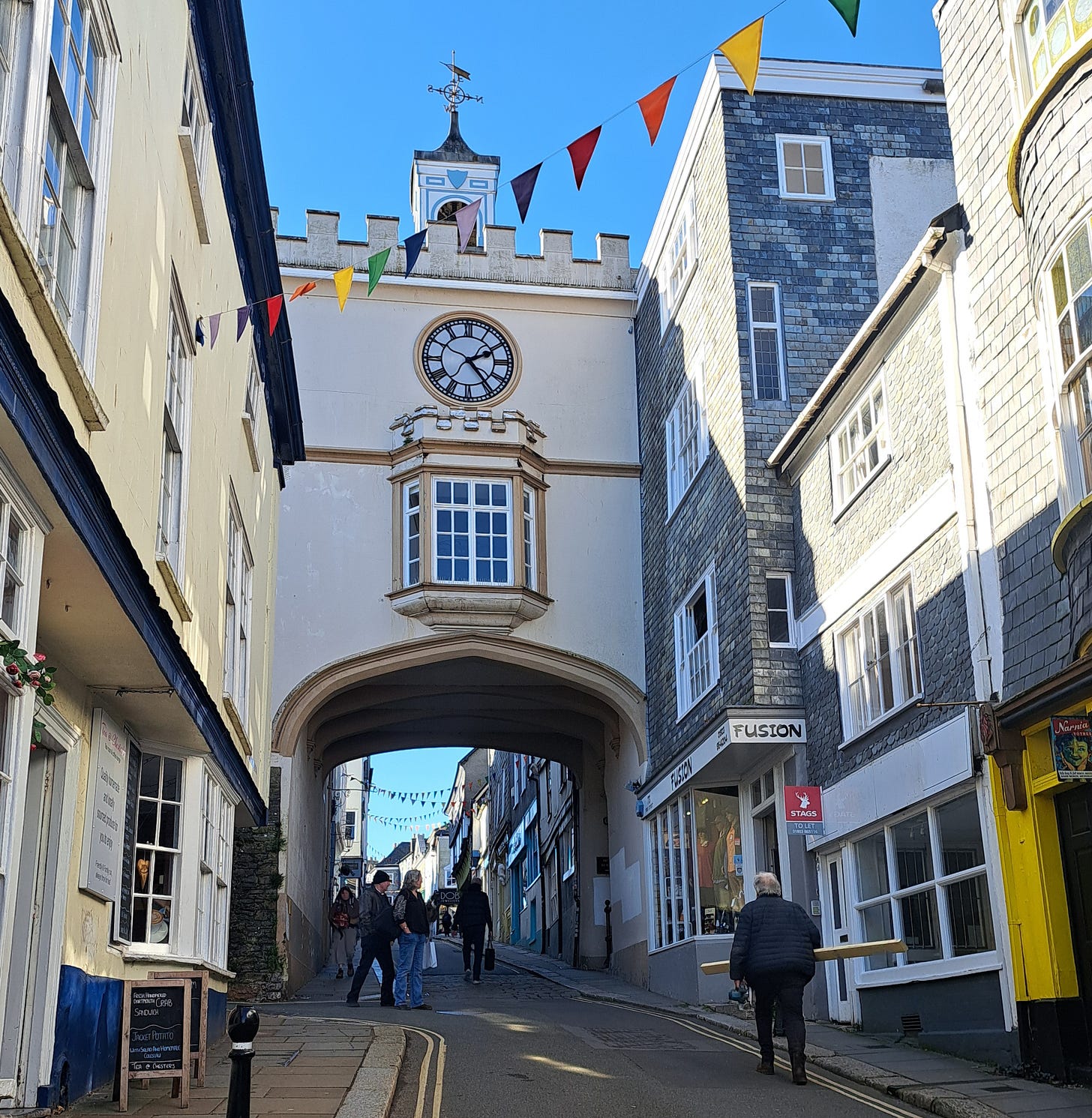
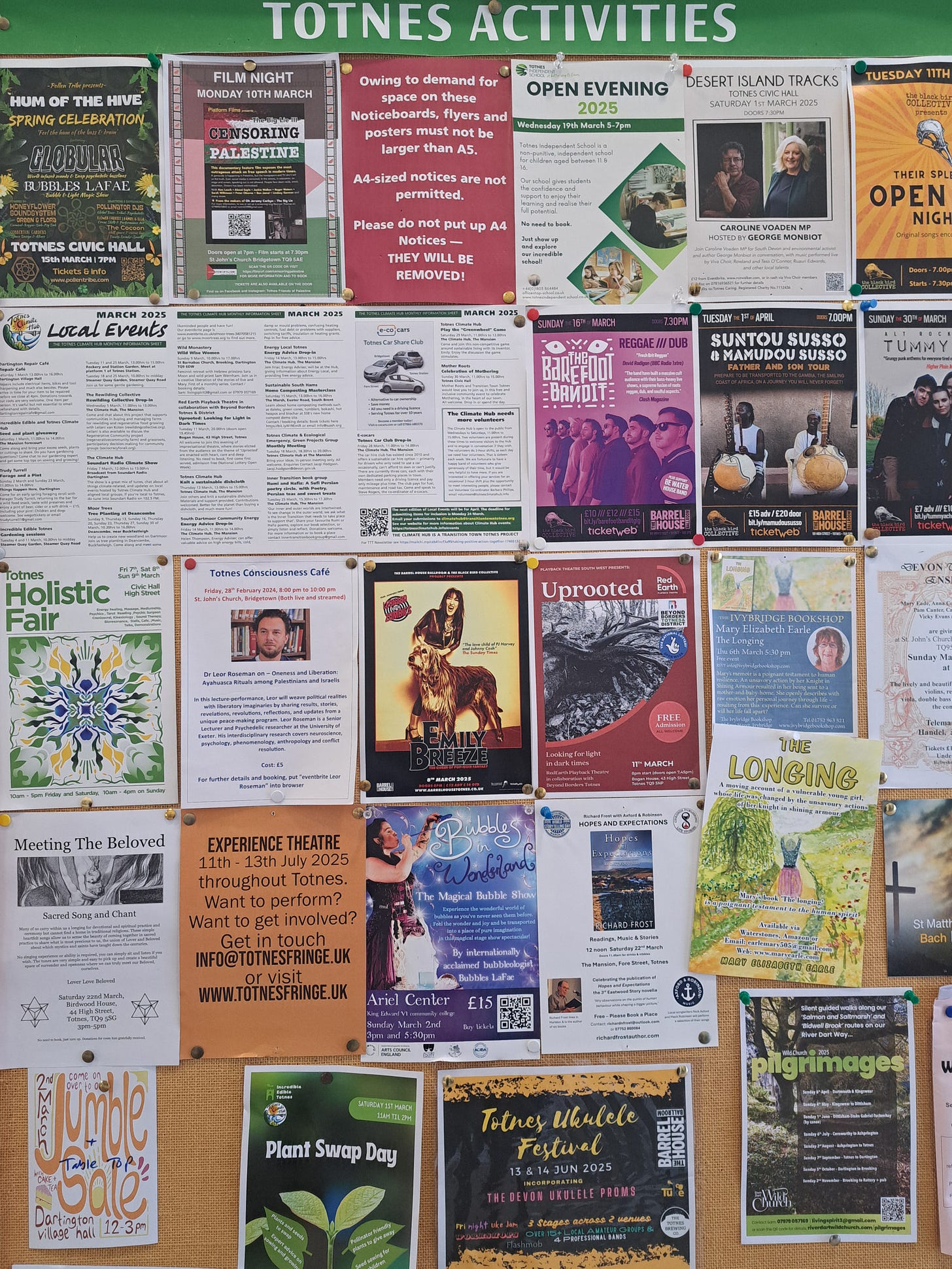
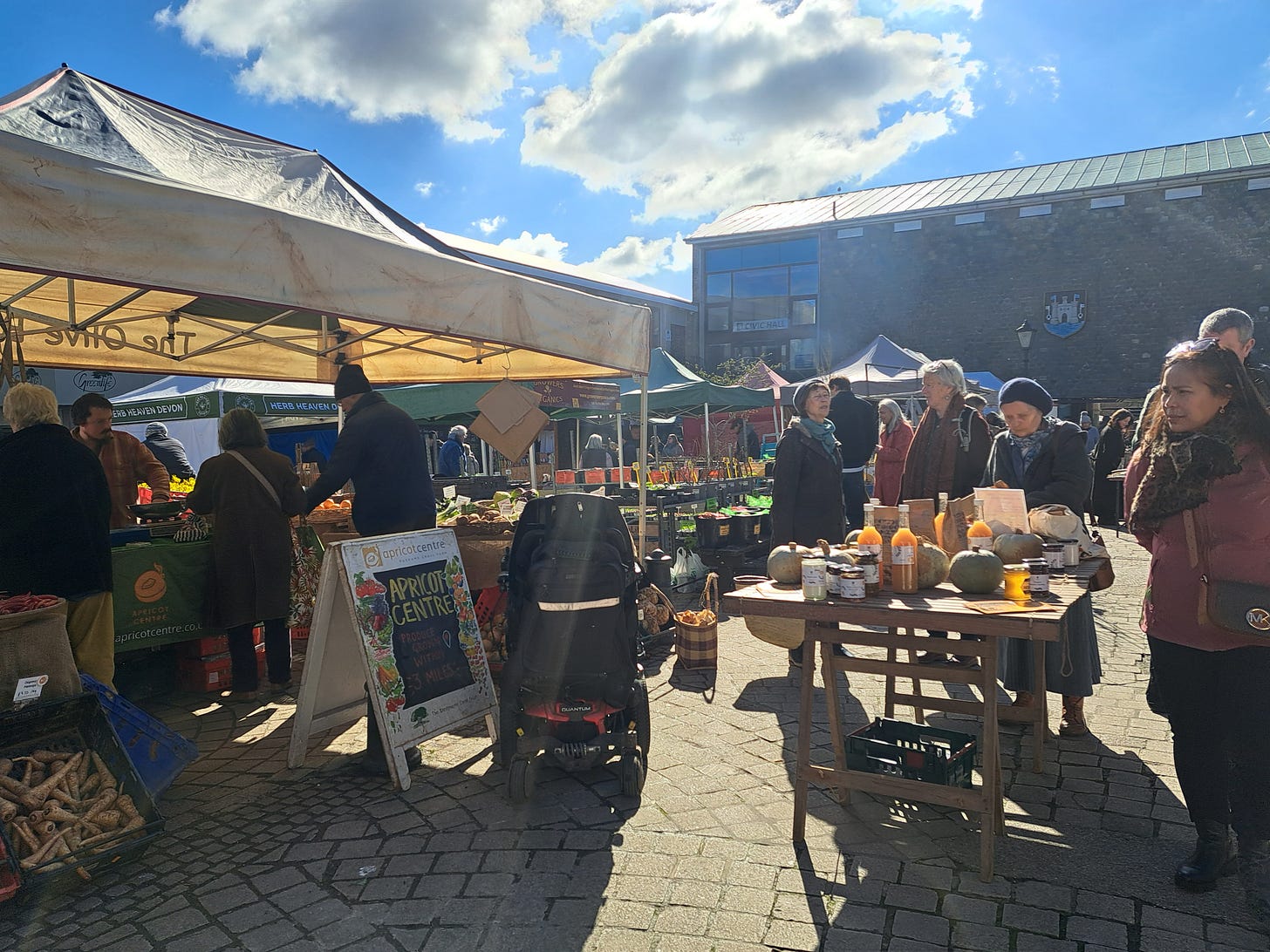




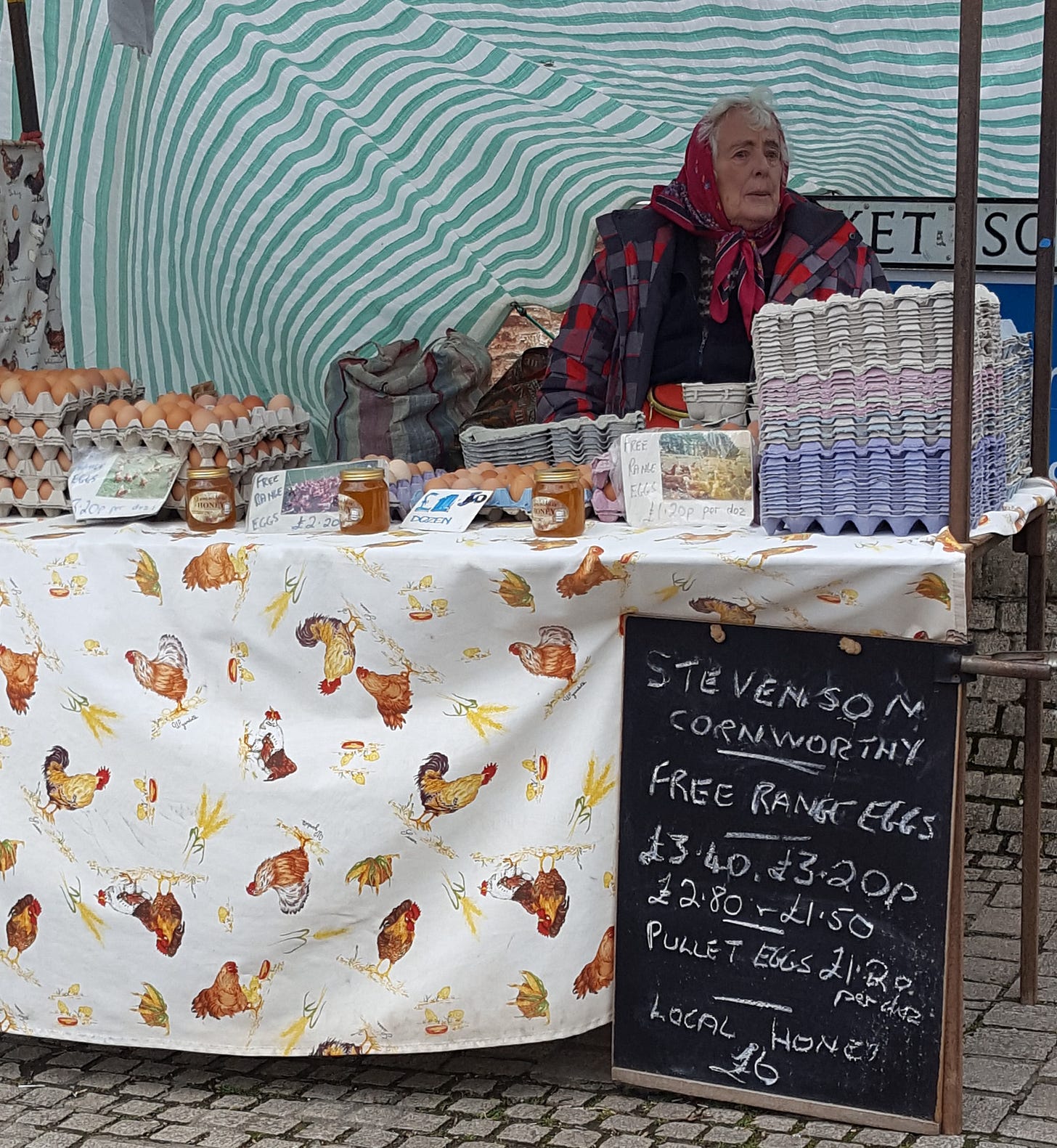
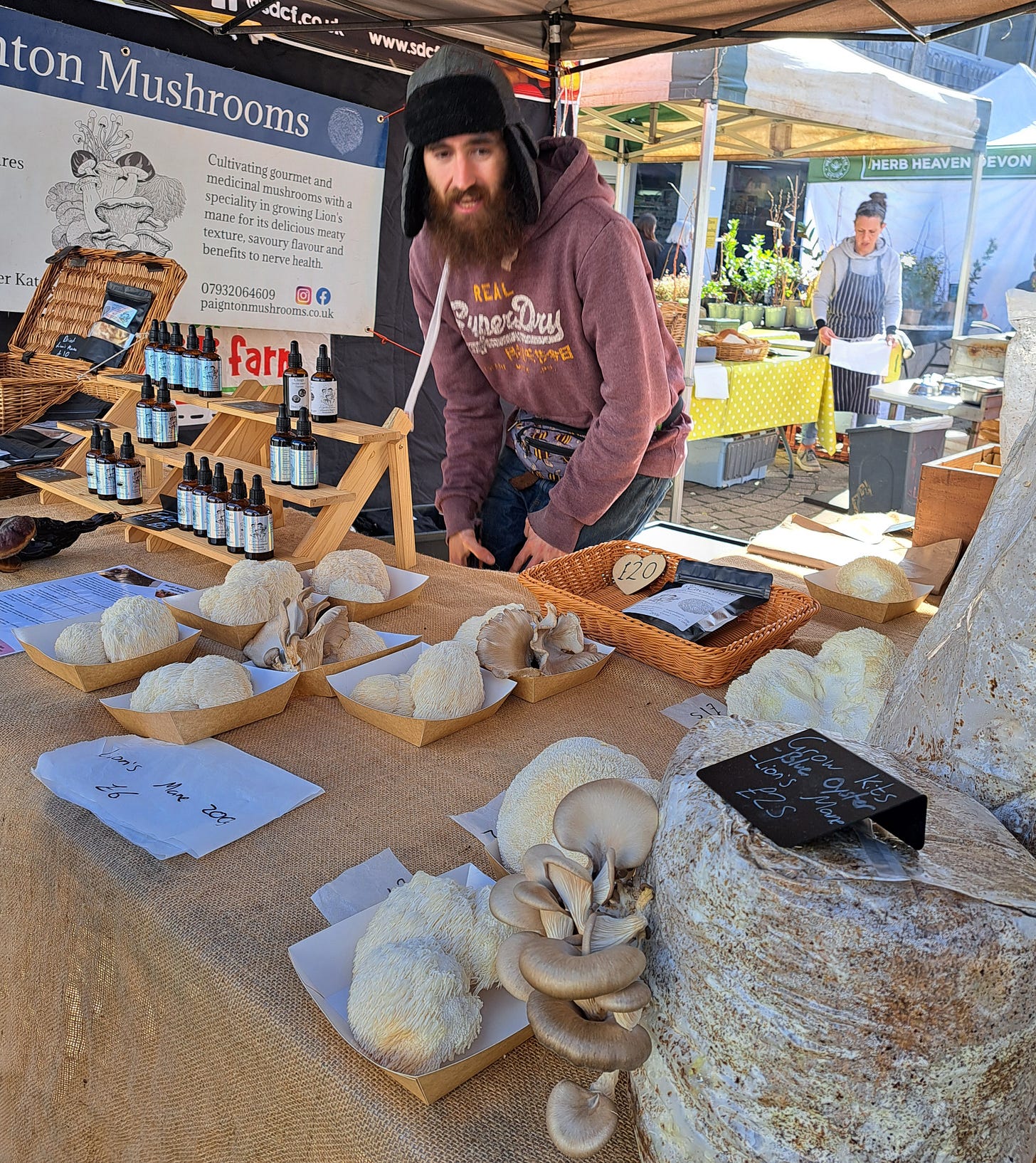


And I published Geetie's Cookbook back in 2010, when she was still at the Duke of Cambridge, and Mabel had just been born! It was such fun working with her on that book. Lovely recipes.
I think I need to move to Totnes right now, Cheryl. Looks like life as it should be lived. I was a member of Transition Town Aberystwyth when the movememt first started. Anyone can dream!